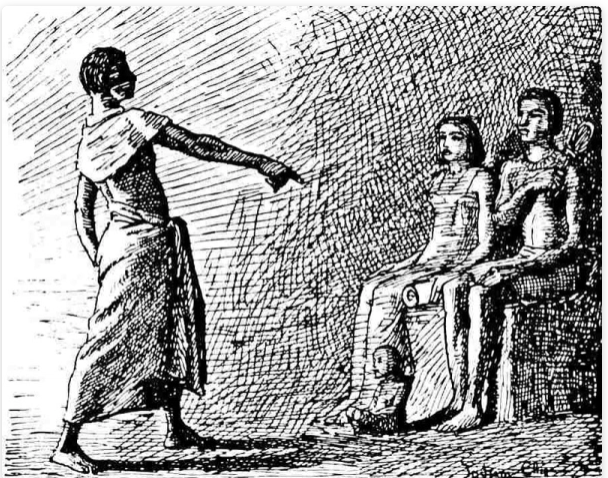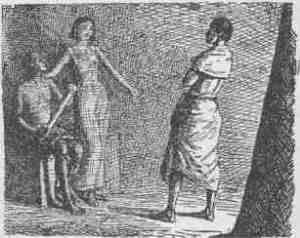I was researching something else and was reminded of this Egyptian story. It’s a classic type of ancient tale. Yes, magic is involved. Isis and Thoth are involved. And dead people are involved.
It is usually called Setne and the Magic Book. It’s the one where the son of Rameses the Great, Setne Kaemweset, learns of a previous prince, Naneferkaptah, who aspired to magical knowledge and had discovered a magic book locked inside a series of chests and sunk in the bottom of the river. And now the son of Rameses, also a glutton for magical knowledge, wants it for himself.
I’d seen reference to that story again and again over the years, but I’d never read the whole thing. Turns out the tale is much more interesting than I’d thought. For one thing, the main story-within-a-story is being told by a woman, Ahwere, the daughter of King Mernebptah and wife of Naneferkaptah. What’s more, she’s dead when she’s telling it.
The tale has five separate sections: the story of how Setne gets the book, loses everything, has a strange adventure with the daughter of a priest of Bast, and eventually learns his lesson and returns the book.
For today’s Isiopolis, I’d like to tell you Ahwere’s tale. It comes from the Ptolemaic period, but as historical fiction, it refers back to a much earlier time. There is only one extant copy of this story. I’m using a translation by Flinders Petrie. The first part of the story is lost, but can be guessed from other information in the story.
Setne and his brother search for and discover the tomb of the former prince, Naneferkaptah, who was supposed to have this most amazing magical book. But when they get to the tomb, they find the kas of the prince, his wife, the princess Ahwere, and their child, Merib, quite present in the tomb. Ahwere warns them away from seeking the book of magic as she relates her tale:
The princess starts by explaining that she and Naneferkaptah were the only children of the king and he loved them both very much. When they were grown, the king decided to marry them to the children of one of his generals. But the queen objected and said the siblings should be married to each other.
The next paragraph is a bit unclear but is a bantering exchange between Ahwere and her father. Apparently Ahwere, too, wanted to marry her elder brother, Naneferkaptah, and had sent a message to her father saying so. He played grumpy, then they both laughed and Ahwere got her way.
She and Naneferkaptah were married. They loved one another and Ahwere soon became pregnant with their child. The king was happy and sent precious gifts. When Ahwere bore her child, he was named Merib, meaning Beloved Heart, and his name was registered in a book in the House of Life.
Naneferkaptah was very keen to learn from the ancient writings and spent much time reading in the Memphis cemetery and deciphering the sacred inscriptions on the monuments. One day, a priest saw him at his work and laughed at him. The priest said that what the prince was working so hard at was worthless compared to the magic book the priest knew of, which was written by Thoth Himself and which “will bring you to the Gods.”
The priest told Naneferkaptah that—quoting here—”When you read but two pages in this, you will enchant the heaven, the earth, the abyss, the mountains, and the sea; you shall know what the birds of the sky and the crawling things are saying; you shall see the fishes of the deep, for a divine power is there to bring them up out of the depth. And when you read the second page, if you are in the world of ghosts, you will become again in the shape you were in on earth. You will see the sun shining in the sky, with all the gods, and the full moon.”
Well, Naneferkaptah was completely excited and promised the priest whatever he wanted if only he would tell Naneferkaptah where the book was. The priest wanted enough silver so that he could have a rich funeral, a wish the prince readily and easily granted.
So the priest told him, “This book is in the middle of the river at Koptos, in an iron box; in the iron box is a bronze box; in the bronze box is a sycamore box; in the sycamore box is an ivory and ebony box; in the ivory and ebony box is a silver box; in the silver box is a golden box; and in that is the book. It is twisted all round with snakes and scorpions and all the other crawling things around the box in which the book is; and there is a deathless snake by the box.”

Then Ahwere says, “And when the priest told Naneferkaptah, he did not know where on earth he was, he was so much delighted.”
She, however, was not happy about her husband’s desire and felt a sense of foreboding. But the prince would not be dissuaded. Taking the royal boat, Ahwere, and Merib with him, the prince sailed to Koptos.
There was a temple of Isis in Koptos and so all the Isis priests came to meet the arrival of the royal boat. The priests entertained the prince and the wives of the priests entertained Ahwere. And so they feasted and “made holiday” with the priests of Isis and their wives.
After four days, the prince was ready to go after his prize. He had apparently learned enough magic that he could create a crew of magical workmen and tools from wax. The prince “put life into” the boat and crew and sent the magical workers off to find the book in the river.
This they did. The book was enclosed and guarded just as the priest had said it would be. Naneferkaptah put a spell on the magical guardians and fought the “deathless snake,” finally cutting him to bits and placing sand between the pieces so they could not rejoin.
The prince opened chest after chest, finally finding the book. He read it and—as promised—he could enchant the heavens and all the rest of the promised powers were his. So he had the magical workmen take him back to where Ahwere waited for him, in her words, sitting “like one who is gone to the grave.”
Now this next part, I found very interesting. Ahwere herself asks to read the book. She does so and she, too, can now enchant the heavens and has gained all the other powers as well. Ahwere can read, but she cannot write, which is needed for the next part of the magic. So she asks Naneferkaptah, who is an excellent scribe, to write everything on the book down on papyrus so that he could dip it in beer, then drink the dissolved words, and thereby know everything that was in them forever.
So back they go to Koptos and “make a feast with Isis of Koptos and Harpokrates.” But by now, Thoth had learned of the theft of His book and the killing of His magical guardians, which really kinda pissed Him off. So Re decrees that Naneferkaptah and all his kin could be killed. Ouch.
And so tragedy strikes. First the child Merib falls in the water and drowns. His father magically brings the body up and enchants the child so he can say what happened. Thus Naneferkaptah and Ahwere learn of Thoth’s anger. They return to Koptos, have their child embalmed and buried, and head back to Memphis.
But on the way back, the same thing next happens to Ahwere. She drowns, is magically brought up, then embalmed and buried in Koptos.

With such disaster befalling his family, Naneferkaptah could not return alive to his father, the king. Tying the book to himself, he drowns himself in the river. None of the crew knew where he was, so they returned to Memphis and related the entire sorry story to the king.
In mourning, the king and his court went to the boat, only to find the body of Naneferkaptah in the inner cabin of the boat—still dead—but at least available for proper rites and burial, which the king has done.
The king also orders the magic book hidden once more. Ahwere concludes, “I have now told you the sorrow which has come upon us because of this book.”
Oh course, Setne still wants the book (he is being quite unwise) and he contests with the ka of Naneferkaptah to get it. The ka of the great magician actually wins the contests, but with the help of the God Ptah and some additional magic, the brother of Setne (remember him?) brings Setne back.
The story of Setna and his further adventures with Naneferkaptah and Ahwere continue, but this post is long enough for now and I’ll tell that on another day.
There are a number of interesting things about this story. Importantly, it is told by a woman. She is no mere appendage, but a main player. We should also note that through Ahwere’s body is in Koptos, which is a LONG way from Memphis, her ka is still present with her husband in his tomb. It is also interesting that Ahwere can read, but not write. So even a princess did not necessarily learn to write. You can also see some of the main mechanisms of Egyptian magic: magical servants, magical guardians, consuming the words of a spell to integrate the magic into yourself, necromancy, and of course, the power-conferring magical book itself. It was also interesting to see the involvement of the priesthood of Isis and Harpokrates in Koptos. In my fantasy version of the tale, they would warn the prince of his coming folly. But I guess you don’t mess with a royal on a mission.








